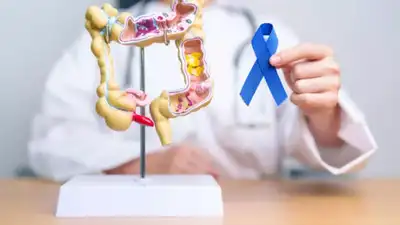ARTICLE AD BOX

Americans born in 1990 face quadruple the risk of developing rectal cancer compared to those born in 1950, according to a large-scale review published in the British Journal of Surgery.Conducted by researchers at the Dana-Farber Cancer Institute and Harvard Medical School, the study found that early-onset gastrointestinal cancers increased by nearly 15% between 2010 and 2019. Colorectal cancer is now the leading cause of cancer death in men under 50 and second in women of the same age group.This surge isn’t largely genetic. Instead, researchers point to environmental and lifestyle-related causes, which they refer to as a “birth cohort effect.”
Younger generations are more exposed to processed foods, sedentary routines, rising obesity, and chemical exposures, creating risk patterns not seen in prior decades. The impact also varies by community: Hispanic patients make up 22% of young stomach cancer cases, versus just 7% of older ones, while Black, Hispanic, and Indigenous groups face disproportionately high rates of early-onset colorectal cancer.
Symptoms of rectal cancer
As per the American Cancer Society, rectal cancer is often silent in its early stages, which can delay diagnosis. As the disease progresses, signs may include changes in bowel habits like diarrhea, constipation, or a frequent urge to pass stool. Patients may feel their bowels don’t fully empty, or see bright red or dark maroon blood in their stool. Other warning signs are abdominal pain, narrow stool, unexplained weight loss, fatigue, and general weakness.
Key risk factors for rectal cancer in young adults

Excess body weight
Obesity significantly increases the risk of developing and dying from colorectal cancer. The association is particularly strong in men. Maintaining a healthy weight can reduce this risk.
Type 2 Diabetes
People with type 2 diabetes face a higher likelihood of developing colorectal cancer, even after adjusting for obesity and inactivity. High insulin levels are believed to play a role.
Unhealthy diet
Long-term diets high in red or processed meats, like beef, hot dogs, or cold cuts, raise colorectal cancer risk.
Low intake of vitamin D, fruits, vegetables, and whole grains also contributes.
Smoking

Tobacco use increases the likelihood of colorectal polyps and cancers. While often linked to lung disease, smoking is also a known risk factor for several gastrointestinal cancers.
Alcohol consumption
Even light-to-moderate alcohol intake can elevate colorectal cancer risk. Men are advised to limit alcohol to 2 drinks daily, and women to 1 drink.
Age and birth cohort patterns
Colorectal cancer is more common after 50, but rates are rising in younger people, likely due to lifestyle and environmental exposures not faced by earlier generations.
Race and ethnicity
As per the recent research, Black, Hispanic, and Indigenous populations are disproportionately affected by early-onset colorectal cancer. The disparities likely reflect systemic health inequities and environmental factors.
History of polyps or prior colorectal cancer
Those with a past diagnosis of adenomatous polyps. especially if large or numerous, are at increased risk. Individuals previously treated for colorectal cancer are also more likely to develop new tumors.

Inflammatory Bowel Disease (IBD)
Conditions like ulcerative colitis and Crohn’s disease cause chronic inflammation, raising cancer risk. People with long-standing IBD may need earlier and more frequent screenings.
Family history
Having a first-degree relative (parent, sibling, or child) with colorectal cancer, particularly if diagnosed before 50, significantly raises one’s own risk.
Inherited syndromes
Around 5% of colorectal cancer cases stem from inherited genetic mutations. Notable examples include Lynch syndrome and familial adenomatous polyposis (FAP), which greatly increase lifetime risk.



.png)
.png)
.png)
















 13 hours ago
5
13 hours ago
5









 English (US) ·
English (US) ·